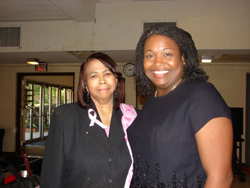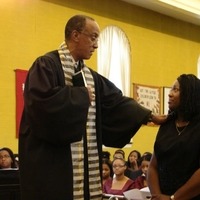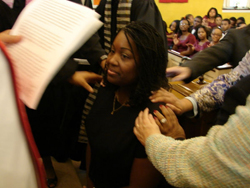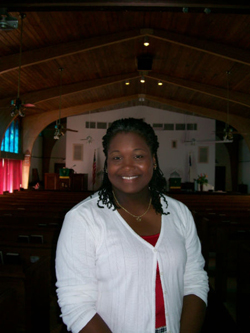In order to achieve domestic harmony and avoid family squabbles, the Rev. CC Armstrong’s mother and father — who were raised in the African Methodist Episcopal and Baptist traditions, respectively — decided in the late 1950s that they would walk to and then join the very first church that welcomed them.
Nearby Calvary Presbyterian Church in Detroit, Mich., where they lived, was the first to receive them with open arms.
Armstrong recalls her parents’ experience as African-American visitors in a largely European-American congregation.
“When my parents heard the choir singing an African-American spiritual the first time they visited, they said, ‘The choir sure could use help with that spiritual,’ ” Armstrong says. “My parents were first and foremost seeking a church where they could use their gifts to serve God, but they were also hoping to broaden the church by inviting it to receive diversity.”
Because Calvary Church had extended such a warm and immediate welcome to her parents — and later to all five Armstrong children, of which CC is the youngest — Armstrong always saw it as her calling to extend that same welcome to others.
Vacation Bible School (VBS) at Calvary — an especially fond memory for Armstrong — proved just such an opportunity for her to exercise her community outreach skills.
“I spent a lot of time as a kid canvassing the neighborhood to bring kids to church,” Armstrong says. “Since I was having fun, I thought they should be, too. Besides, they served lunch!”
Her early evangelistic efforts resulted in a “whole collection of kids who ended up having so much fun,” she says. “At the age of 12, I was the pied piper leading kids to church.”
Armstrong’s formative experiences at Calvary’s VBS and also as a camper — and later as a counselor-in-training and a director of Camp Sarah Grindley in Michigan — further confirmed her call to work with young people. Although she sensed this could also be “the seeds of ministry,” Armstrong says that she “didn’t see any of it.”
When a tour of the Historically Black Colleges and Universities in the Atlanta area during her high school years landed her at the Interdenominational Theological Seminary (ITC) — across a huge conference table from the Rev. Dr. James Costen, a former president of ITC and the 1982 moderator of the United Presbyterian Church in the United States of America (UPCUSA) — she knew otherwise.
“When Jim Costen said, ‘One of you I’m going to see here again,’ I felt he was talking straight to me,” she recalls, “but I was deliberately trying to run from my call.”
Among the colleges that she had visited on that trip, Armstrong chose to attend Spelman College, from which she graduated with a B.S. in mathematics. While a student there, she was active in the New Life Presbyterian Church in the Atlanta suburb of College Park, under the mentorship of the Rev. Dr. Lonnie Oliver. She also served as youth representative on the National Black Presbyterian Caucus, from which she received the prestigious Lucy Craft Laney Award for her efforts to encourage youth to have their own voice.

Elder Adrienne Adams, a member of Calvary and CC Armstrong's former Youth Leader. —Photo by Marilyn Borst.
Because teaching is what she always thought she was “supposed to do,” Armstrong applied for her first teaching job through the Teach for America program. Assigned to a school in rural Greensboro, Ga., she took a group of girls on a field trip to worship with her at the New Life Church.
“One young lady on seeing Lake Oconee asked me, ‘Ms. Armstrong, is this the Atlantic Ocean?’ because she had never left Greensboro,” Armstrong recalls. “Even as I was helping to open up new horizons for them, I knew there was something else that I was supposed to be doing with my life but I just kept justifying the course I was following at the time.”
After earning a Master of Education degree from the University of Southern Mississippi and relocating to Augusta, Ga., for a new teaching position there, Armstrong found herself with a free summer in 2006. She first visited old friends in Detroit and later attended the Churchwide Gathering of Presbyterian Women, where she had a life-transforming encounter with the Rev. Dr. Katie Geneva Cannon, the Annie Scales Rogers Professor of Christian Ethics at Union Presbyterian Seminary.
Back in Augusta, the members of the Belle Terrace Presbyterian Church, which Armstrong had joined, all knew that she was “running from her call.” Upon returning home, Armstrong knew she could run no longer. “I heard God’s voice say, ‘I told you to go to seminary,’ and I literally dropped everything,” she says. The respected high school mathematics teacher and winning head coach of a varsity volleyball team entered Johnson C. Smith Theological Seminary.

The Rev. Kevin Johnson, Calvary's pastor, gives a charge to CC Armstrong. —Photo by Marilyn Borst.
“I left behind my previous mathematics students, who had gone from rankings in the 40th percentile on state mandated tests to the 65th percentile rankings within the constraints of one school year,” she says. “My previous volleyball teams had gone from the worst-ranked team in the region to regional champions who went as far as the Sweet Sixteen in the state competition. I do not view or imagine winning souls to Christ as a competitive action, but I do believe that my spiritual gifts of exhortation and my talents in organization, administration and goal setting will bring renewed growth to the congregation that God calls me to serve.”
Armstrong’s first call — to which she was ordained on Sunday, October 16, at Calvary Presbyterian Church in Detroit—was to the Grace Presbyterian Church, in Lantana, Fla. She is one of two pastoral residents called through the For Such a Time as This program to serve in Tropical Florida Presbytery.
For Such a Time as This: A Small Church Residency—Growing Leaders, Growing Churches pairs congregations with recent seminary graduates in a two-year pastoral residency relationship. A unique aspect of the arrangement is that each pastoral resident receives the support and guidance of a network of pastor/mentors that includes presbytery and national church leaders.
The program’s name, For Such a Time as This, from the Old Testament book of Esther, draws a parallel between Esther’s unexpected rise to leadership in her own day and the PC(USA)’s call for leaders to serve in a rapidly changing and challenging 21st-century context. About 4,000 of the denomination’s more than 10,000 congregations average fewer than 50 people in attendance each Sunday.

Laying on of hands at CC Armstrong's ordination at Calvary Presbyterian Church. —Photo by Marilyn Borst.
“I was attracted to the program because I wanted to serve a small, diverse congregation that is sincere about planning and implementing programs to enhance worship, nurture, stewardship and evangelism,” Armstrong says. “Grace is just such a church.”
Of the recent orientation that was held in Louisville, Ky., for the ten members of the For Such a Time as This Class of 2011 — and their six counterparts in the inaugural Class of 2010 — Armstrong says, “The biggest highlight is knowing that my classmates are an email away. My network of resources has just expanded with people who are experiencing the same things I will be experiencing.”
As Armstrong looks forward to developing an intentional plan of action to attract new members to Grace while meeting the congregation’s spiritual needs, she knows she is not alone.
“I think this is the first time that I’ve acted on faith and was able to see God’s net for catching,” she says.
# # #
For Such a Time as This: A Small Church Residency — Growing Leaders, Growing Churches is currently seeking gifts to allow the program to continue to help grow Christ’s church deep and wide by reenergizing and renewing our small congregations. Visit the website for further information on how to make a gift online.

